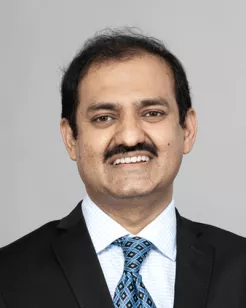Surgical oncology is a specialized field within surgery that concentrates on utilizing surgical methods for the management of cancer. The expertise of surgical oncologists comes into play as they meticulously evaluate, diagnose, and determine the stage of cancer, employing surgical interventions to effectively treat and manage cancer-related symptoms. This approach is particularly crucial in the comprehensive care and treatment of individuals facing various types of cancer.
At Aster International Institute of Oncology (AIIO), the Department of Surgical Oncology goes beyond conventional care, offering a comprehensive range of world-class outpatient and inpatient services. These services span from initial diagnostic screenings tailored for cancer treatment to thorough follow-up care for patients. The department's commitment lies in identifying not just the presence of cancer but also understanding the specific cause and grade of the disease. This personalized approach ensures that individuals suffering from malignant and benign tumors, along with other cancer-related symptoms, receive tailored and effective care.
What sets this department apart is its commitment to a multidisciplinary team approach. Surgical oncologists collaborate seamlessly with a diverse array of specialists, including radiologists, pathologists, medical oncologists, radiation oncologists, nuclear medicine experts, plastic and reconstructive surgeons, cancer care nurses, psychologists, nutritionists, and physiotherapists. This collaborative effort is designed to provide the best possible outcomes for patients while also anticipating and managing any potential side effects associated with surgical interventions.
From the beginning to the end of the cancer treatment journey, the department adopts a holistic approach. This involves addressing every aspect of cancer care, encompassing screening and prevention, early diagnosis, staging, both localized and systemic treatment, reconstruction, when necessary, meticulous follow-up care, rehabilitation, and palliative care. The focus extends beyond the disease itself to enhance the overall well-being of individuals undergoing cancer treatment, fostering a comprehensive and supportive environment for patients and their families.
Treatments & Procedures
We provide comprehensive treatment for all types diseases under one roof. Our highly experienced doctors supported by especially trained clinical staff, ensure the best care for you.
Advanced Technology & Facilities
Well equipped with the latest medical equipment, modern technology & infrastructure, Aster Hospital is one of the best hospitals in India.
- Pain and Palliative Care Diet
- Physiotherapy
- Psychological
- Genetic Counselling Clinic For Lifestyle Against Cancer Recurrence Full-fledged Ayurveda Department.
- Da Vinci Robotic
- Surgeries Minimal invasive surgeries
- HIPEC surgeries
- Organ preservation surgeries.
Faqs
Want to find out more about the treatment? The answer to your questions can be found below.
What is Surgical Oncology?
Surgical oncology is a treatment method where your oncologist will make use of surgery to treat cancer. This type of treatment method also involves the application of chemotherapy, radiation therapy, surgery, hormone therapy, bone marrow transplant, immunotherapy, targeted drug therapy and more. In surgical oncology, your oncologist will perform the following procedures -
- Performs biopsy to diagnose and determine the stage and type of cancer.
- Surgically removes the tumour or a part of it along with other affected body parts.
- Reconstructs the parts that are affected by the surgical treatment.
What is the difference between medical oncology and radiation oncology?
Medical oncologists treat cancer using chemotherapy, hormonal therapy, biological therapy, and targeted therapy whereas radiation oncologists use radiation therapy to treat cancer.
What is the difference between surgical oncology and medical oncology?
Medical oncology makes use of medicines to treat cancer, whereas surgical oncology uses surgical procedures to restrict and remove cancer growth.
What are the different types of cancer that can be treated through surgical oncology?
As surgical oncology is the first line of treatment, it can be used to treat most types of cancers including breast cancer, colorectal cancer, pancreatic cancer, liver cancer, head and neck cancer, lung cancer, ovarian cancer, etc.
What types of cancers can be treated using surgical oncology?
Surgical oncology is used to treat most types of cancers including -
- Breast cancer
- Colorectal cancer
- Pancreatic cancer
- Liver cancer
- Cancer of the head and neck
- Lung cancer
- Ovarian cancer.
How many types of procedures are performed under surgical oncology?
Depending on the objective of the treatment, various types of procedures are performed In surgical oncology. These include -
- Diagnostic surgery - This type of surgery generally involves cutting out a small area of the tissue (incisional biopsy) or removing an entire mass (excisional biopsy).to determine whether the tumour is benign or not.
- Preventive surgery - This type of surgery is performed to prevent the cancer risk and during this surgery, any risk factors that may lead to cancer are detected and removed.
- Staging Surgery - It is a procedure that is performed to check the stage of cancer.
- Curative surgery - Once cancer has been detected and its stage has been determined, curative surgery is performed to remove the cancer cells and other body tissues that may be affected by the cancer cells.
- Reconstructive surgery - This surgery is performed to restore and reconstruct the affected body part.
- Palliative surgery - Even though this surgery may not treat cancer, but it provides relief from the symptoms of cancer. With palliative surgery, your doctor will remove the pain-causing tumours in your body.
How can you differentiate between surgical oncology and general surgery?
A general surgery cannot handle the complicated and specialized cases of cancer while a surgical oncologist is trained to perform surgical procedures and techniques to treat cancer.
How effective is surgical oncology in treating cancer?
The effectiveness of the cancer treatment is dependent on its stage. Therefore, every doctor recommends early diagnosis of cancer as it ensures that cancer cells and affected tissues are removed effectively and timely care is provided.
What are the risks in surgical oncology?
There are several risks in surgical oncology. These include -
- Pain
- Bleeding
- Infection
- Delayed healing of the wound.
Patient Stories
Our patients are our best advocates, hear the inspiring stories of their treatment journey
Blogs
The source of trustworthy health and medical information. Through this section, we provide research-based health information, and all that is happening in Aster Hospital.




















